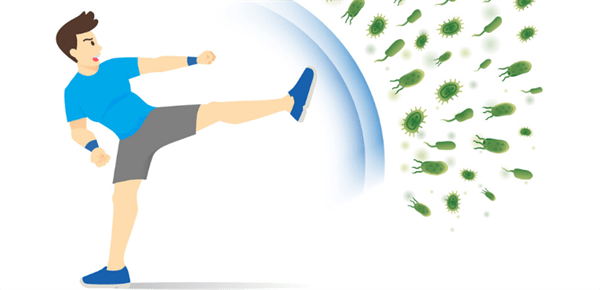Even the most committed exercisers may be struggling to stay active at a time when most of the population is largely confined to their homes. In fact, for those who are accustomed to exercising in a gym or group setting, finding the motivation to keep moving at home can prove particularly challenging. Bolstering immunity and good health, however, has never been more important. A new research review highlights the power of regular, daily exercise on the immune system and the importance of people continuing to be physically active, even during a lockdown.
The new research review, which is published in the international journal Exercise Immunology Review, highlights the importance of staying physically active at this time. The research confirms what you and other health and exercise professionals have been undoubtedly communicating to your clients: being in isolation without access to gyms and sports clubs should not mean people stop exercising. Rather, keeping up regular, daily exercise at a time when much of the world is in isolation can play an important role in helping to maintain a healthy immune system.
Does Strenuous Exercise Help or Hamper Immunity?
The analysis, which was led by Dr. John P. Campbell and Dr. James E. Turner from the University of Bath’s Department for Health in the United Kingdom, considers the effect of exercise on immune function. According to researchers, many studies over the past four decades have investigated how exercise affects the immune system. It is widely agreed that regular moderate-intensity exercise is beneficial for immunity, but a view held by some is that more strenuous exercise can suppress immune function, leading to an “open window” of heightened infection risk in the hours and days following exercise.
In a benchmark study in 2018, this “open window” hypothesis was challenged by Campbell and Turner. They reported in a review article that the theory was not well supported by scientific evidence, summarizing that there is limited reliable evidence that exercise suppresses immunity, concluding instead that exercise is beneficial for immune function.
“. . .exercise can help the immune system find and deal with pathogens.”
In the short term, they concluded, exercise can help the immune system find and deal with pathogens. In the long term, regular exercise slows down changes that happen to the immune system with aging, which subsequently reduces the risk of infection.

In the current review, Turner, Campbell, and colleagues examined whether the immune system can change negatively or positively after exercise and whether athletes get more infections than the general population. The researchers concluded that infections are more likely to be linked to inadequate diet, psychological stress, insufficient sleep, travel, and, importantly, pathogen exposure at social gathering events such as marathons, rather than the act of exercising itself.
“Our work has concluded that there is very limited evidence for exercise directly increasing the risk of becoming infected with viruses,” explains Dr. Turner. “In the context of coronavirus and the conditions we find ourselves in today, the most important consideration is reducing your exposure from other people who may be carrying the virus. But people should not overlook the importance of staying fit, active, and healthy during this period. Provided it is carried out in isolation—away from others—then regular, daily exercise will help better maintain the way the immune system works, not suppress it.”
Dr. Campbell wants to alleviate people’s fears that exercising might suppress the immune system and therefore increase one’s risk of contracting coronavirus. “Provided exercise is carried out according to the latest government guidance on social distancing, regular exercise will have a tremendously positive effect on our health and well-being, both today and for the future.”
A few more tips from researchers: At this current time, the importance of maintaining good personal hygiene when exercising, including thoroughly washing hands following exercise, cannot be overstated. To give the body its best chance at fighting off infections, they also suggest that, in addition to doing regular exercise, people need to pay attention to the amount of sleep they get and maintain a healthy diet that is energy balanced to account for energy that is used during exercise.
7 Steps for Decreasing Infection Risk
- Maintain good personal hygiene when exercising, including thorough hand washing after exercise.
- Exercise regularly for a positive effect on health, well-being. and immune system function.
- Get enough sleep.
- Maintain an energy-balanced healthy diet.
- Positively manage stress.
- Limit travel.
- Limit attendance at social gatherings.
Article reprinted with permission of the American Council on Exercise







